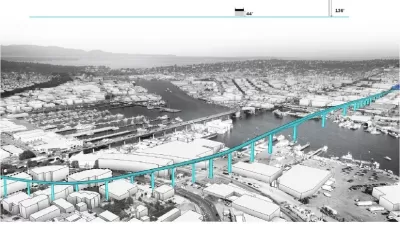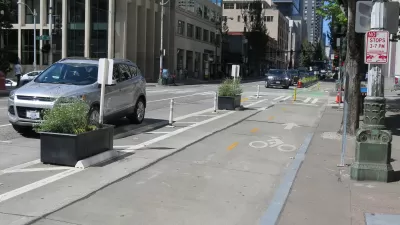Two studies begin the process of spending billions of dollars for infrastructure in Ballard and Interbay in Seattle. According to this critique, the effort is off on the wrong foot.

The Seattle Department of Transportation (SDOT) recently released two studies, one to replace the Ballard Bridge, a key link in the city's transportation system, and another to address a number of transportation investments along the Ballard-Interbay Corridor.
"They are both categorical failures," writes Ray Dubicki.
The Ballard Bridge study "makes a series of half-baked assessments that total up to several very wrong alternatives," according to Dubicki.
The Ballard Interbay Regional Transportation Study (BIRT), initiated by the state, is a "rewarmed plate of soggy old plans."
According to Dubicki, the failures of these plans reveal some of the weaknesses of modern urban planning.
"They are traffic study pseudoscience wrapped in a thin gauze of social justice, like stuffing styrofoam into a reusable bag. In the few times one of the studies picks up a complex issue, they find the way to develop the most regressive answer possible, usually adding more asphalt. The rest of the time, they kick hard questions down the line or just deny they are part of the study to begin with."
These harsh words don't go without backing evidence, as Dubicki provides a level of analysis rare in planning media.
FULL STORY: Two Horrendous Studies Perpetuate Efforts To Destroy Interbay

Maui's Vacation Rental Debate Turns Ugly
Verbal attacks, misinformation campaigns and fistfights plague a high-stakes debate to convert thousands of vacation rentals into long-term housing.

Planetizen Federal Action Tracker
A weekly monitor of how Trump’s orders and actions are impacting planners and planning in America.

Chicago’s Ghost Rails
Just beneath the surface of the modern city lie the remnants of its expansive early 20th-century streetcar system.

Bend, Oregon Zoning Reforms Prioritize Small-Scale Housing
The city altered its zoning code to allow multi-family housing and eliminated parking mandates citywide.

Amtrak Cutting Jobs, Funding to High-Speed Rail
The agency plans to cut 10 percent of its workforce and has confirmed it will not fund new high-speed rail projects.

LA Denies Basic Services to Unhoused Residents
The city has repeatedly failed to respond to requests for trash pickup at encampment sites, and eliminated a program that provided mobile showers and toilets.
Urban Design for Planners 1: Software Tools
This six-course series explores essential urban design concepts using open source software and equips planners with the tools they need to participate fully in the urban design process.
Planning for Universal Design
Learn the tools for implementing Universal Design in planning regulations.
planning NEXT
Appalachian Highlands Housing Partners
Mpact (founded as Rail~Volution)
City of Camden Redevelopment Agency
City of Astoria
City of Portland
City of Laramie





























